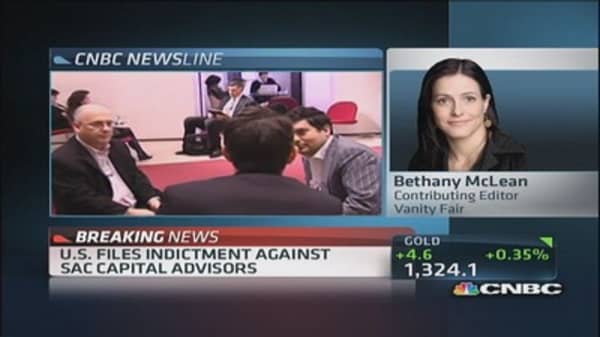The papers describe how Cohen rejected the advice of his own analysts and instead bet heavily on Martoma's tips about secret data from a study of an experimental drug. After learning through Martoma in 2008 that experiments weren't going well, Cohen instructed his top trader to begin dumping stock, "and to do so in a way to not alert anyone else," the papers say.
In the past, the Justice Department has been wary of bringing criminal prosecutions against entire organizations out of fear of the "collateral consequences" -- that going further than fining a company could completely shut it down. The accounting firm Arthur Anderson went under after its conviction in 2002 of destroying Enron-related documents before the energy giant's collapse—an outcome that cost tens of thousands of jobs.
(Read more: Indictments can kill a company)
U.S. Attorney Preet Bharara, in remarks last week not specific to the SAC Capital probe, alluded to the Arthur Anderson episode.
"We have a lot of power to bring cases like that and we don't do it a lot in part because of Arthur Andersen, and part because we care about what the interest of justice requires and we care about collateral consequences," Bharara said. "But there are circumstances in which it is appropriate to do, particularly when you have continued malfeasance over time among a large number of people."
(Read more: No one is too big to jail, Wall Street cop says)
There are already reports that SAC's clients are pulling their money from the Stamford, Conn.-based firm. It's not always an easy process: Clients usually have to give notice of at least 30 days. Hedge funds, to protect themselves from such metaphorical runs on the bank, can write into their contracts that they'll deny withdrawal requests if too many clients want to pull out money at the same time.
In the face of mounting legal woes, Cohen has kept up his philanthropic efforts. The Steven and Alexandra Cohen Foundation, named for Cohen and his wife, recently helped sponsor a $10,000-per-table poker tournament in Manhattan that raised money for an education advocacy group.
—By The Associated Press. Additional reporting by CNBC's Kate Kelly.






